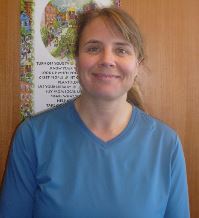UC San Diego Researchers Seek San Diego Residents for Study on Health Effects of Neighborhoods
San Diego, Calif., Nov. 3, 2015 — Researchers at the University of California, San Diego are seeking residents of San Diego County for a study on how the places in which we spend our time (home, work, neighborhoods) affect cancer risk factors. The aim of the “Community of Mine” study is to determine if there is a link between the built environment (i.e. access to healthy foods and places to be active) and biomarkers of cancer risk, such as insulin resistance and inflammation.

Leading the study is Dr. Jacqueline Kerr, an associate professor of in the Department of Family Medicine and Public Health and the director of the Research in Environments, Active Aging and Community Health (REACH) group at the UC San Diego Qualcomm Institute. She and her colleagues hope to enroll 700 San Diego residents between the ages of 35 and 80 who live in predetermined areas of the county to participate in the ongoing study. Participants must have lived at their current residence for one year, be able to walk without human assistance, be comfortable reading and writing in either English or Spanish and leave their home at least three times per week.
Participants are asked to attend a clinical visit and wear three small biometric devices for two weeks (the devices are small, lightweight and worn comfortably on the body). They will also be asked to fill out surveys about their usual activities, the foods they eat, neighborhood surroundings and general habits. Those who complete the study will be paid up to $100 and may also receive additional travel money to cover the cost of travel to their clinic visit.
Says Kerr: “We understand that the environments where we live and work are important to health, but historically we haven't had good ways to measure how and where we spend our time. This study responded to a special call from the National Cancer Institute to use new technologies such as GPS devices to better assess how time and place affect our cancer risk.”
Past studies have shown that physical activity, sedentary behavior, diet and obesity are key factors that influence insulin resistance and associated inflammation, which can lead to obesity-related cancers (such as breast and colon cancer) in high-risk populations. The Community of Mine study is recruiting equal numbers of Hispanic and non-Hispanic adults to see if risk varies in these groups. This study will be the first to examine how time spent in neighborhoods that differ in walkability and access to healthy foods relates to levels of insulin and inflammation, and thus exposure to cancer risk.
More details of where people live and spend time will help policymakers understand how to make improvements to neighborhoods to support health. Health is now an important part of the regional plan for the region's growth, recently approved by the San Diego Association of Governments (SANDAG), including infrastructure investments aimed at increasing physical activity and access to healthy foods.
Those who are interested in participating in the study can visit the study website to see if you live in an eligible neighborhood. For further information email mycommunity@ucsd.edu or call (858) 534-9333.
Related Links
The Community of Mine study website
Media Contacts
Tiffany Fox, (858) 246-0353, tfox@ucsd.edu
